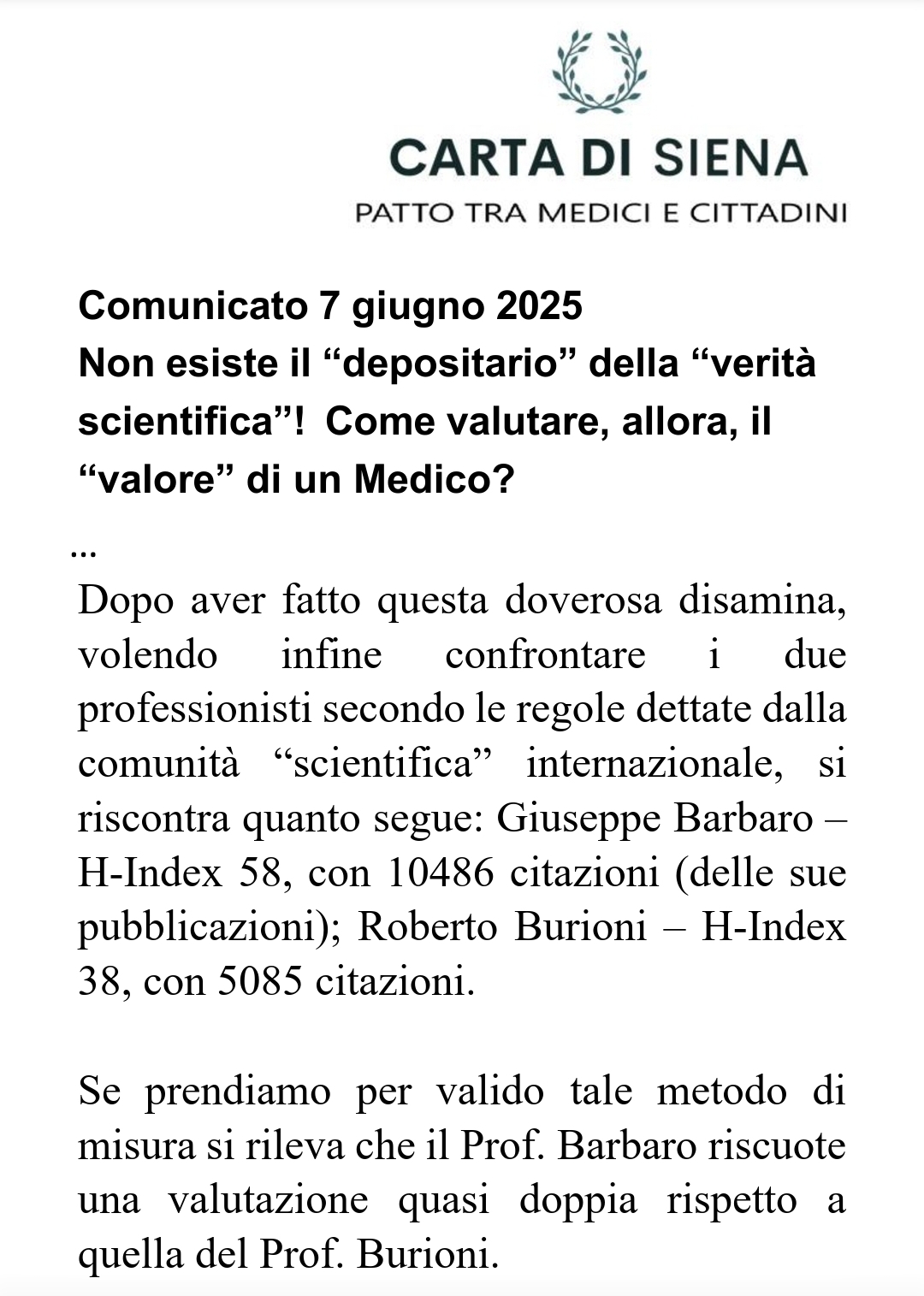Blog News
Blind Maze
Links
Press

How to evaluate the value of a doctor
Posted June 09th, 2025
Some passages of the statement (link to the document at the bottom) of the Board of Directors of the Medici of the Charter of Siena after the statements damaging to the authority of Dr. Giuseppe Barbaro by Roberto Burioni.
The repetition of unpleasant public interventions by some doctors, moreover made famous and undeservedly incensed by the mainstream channels precisely for this function of "ridiculing" the opinions of other doctors who draw their information from scientifically demonstrable data, has led us to try to clarify the general terms of the problem under consideration. The last case is that in which Prof. Burioni tries to diminish, as usual without substantiating his opinion therefore in itself "anti-scientific," as stated by Prof. Giuseppe Barbaro in the program of Heather Parisi.
A doctor, to be truly such, must possess three qualities: 1) know, 2) know how to do, 3) know how to be (a doctor).
We knowm edicine is (and will always remain) an "empirical science" that, based on evidence, uses the experimental method, that is, the continuous control and critical re-evaluation of the fact that the hypotheses are consistent with the observations in the field ... not falling within the "exact sciences," the progress of medical knowledge is nourished and grows with debate and comparison, of evidence and refutations, arguments and counter-arguments: in a word it is nourished and grows through "doubt." To affirm "absolute and certain truths," especially in medicine, is to deny science and use one's role as a doctor to mislead citizens.
Knowing how to do it?
In recent decades, the economic and political interests behind the "non-neutrality" of scientific research have made the results published, even by journals so far considered reliable, to be taken cum grano salis and not accepted uncritically and fideistically, especially when the research shows exactly the opposite of what our direct experience lives. In any case, this world of so-called official science, uses meters of measurement for professionals such as the so-called "H-Index" that tends to measure the recognized quality, officially to the various authors of publications in scientific journals, so we will make the evaluations on this basis.
Knowing how to be (a doctor)
The Hippocratic Oath, on the point of a possible conflict of opinions between colleagues, prescribes: "to inspire the solution of any divergence of opinions to mutual respect." The Code of Ethics, in Article 58, prescribes: "The doctor bases the relationship with colleagues on the principles of solidarity and collaboration and mutual respect for technical, functional and economic skills, as well as related autonomy and responsibilities. The doctor deals with any conflicts with colleagues with mutual respect."
After having made this necessary examination, finally wanting to compare the two professionals according to the rules dictated by the international "scientific" community, we find the following: Giuseppe Barbaro - H-Index 58, with 10486 citations (of his publications); Roberto Burioni - H-Index 38, with 5085 citations.
If we take this method of measurement as valid, it is noted that Prof. Barbaro is almost twice as high as that of Prof. Burioni.
But we put Ethics first and see it as the main element on which to base judgment.
The attribution of the ethical value of Dr. Barbaro's behaviors is easily deductible compared to what he daily does in favor of social well-being, mirrored without ulterior motives and conflicts of interest but rather risking sanctions in a system where white is named black and vice versa. On the work of Professor Burioni and especially on his position with regard to the demonstration of the absence of personal conflicts of interest, the person concerned is asked for a public statement.


9 comments
July 16th, 2025 09:34
At coursefpx, we believe that evaluating the value of a doctor goes far beyond credentials — it involves trust, communication, patient care, and ethical commitment. This topic highlights the importance of looking at both clinical expertise and the human side of healthcare. Patients deserve providers who not only treat conditions, but also listen, educate, and build lasting relationships. A well-rounded and timely discussion in today’s evolving medical landscape.
July 22th, 2025 07:53
Looking for fast Madhur Matka and Satta Matka results? Visit Sattamatkavipresult for Madhur Day, Indian Matka, and fullSatta Matta Matka updates.
July 22th, 2025 07:54
Looking for fast Madhur Matka and Satta Matka results? Visit Sattamatkavipresult for Madhur Day, Indian Matka, and full Satta Matta Matka updates.
October 31th, 2025 11:11
NURS FPX 4015 Assessment 4 focuses on evaluating leadership approaches that support ethical nursing practice and promote positive patient outcomes. In this assessment, students reflect on their leadership strengths, professional values, and opportunities for growth within a healthcare environment. The purpose of NURS FPX 4015 Assessment 4 is to help learners develop a personal leadership philosophy that aligns with evidence-based standards and supports high-quality patient care.
November 09th, 2025 08:47
Step into a physics-driven fantasy where you guide delightfully wobbly champions, mastering the art of chaotic aim to launch projectiles at both targets and rivals in Ragdoll Archers Game.
November 09th, 2025 08:48
Navigate treacherous tracks with precision, commanding nimble cars and powerful trucks through a world governed by physics, where every move determines your vehicle's final stance in the Drive Mad unblocked.
November 09th, 2025 08:49
Navigate countless reimagined arcade arenas in Block Breaker Game, where your paddle becomes an instrument of precision through intuitively responsive controls, systematically dismantling elaborate, colorful brick formations.
December 04th, 2025 16:18
For more than 15 years, our Auckland house roof repair specialists have provided top-notch services to homes and businesses. We are deeply committed to ensuring your property benefits from a secure and properly maintained roof.
December 11th, 2025 12:33
Indeed! The doctor deals with any conflicts with colleagues with mutual respect.
Cheers,
Commercial Interior Painting Philadelphia
Post a comments
Login or Register to leave a comment.